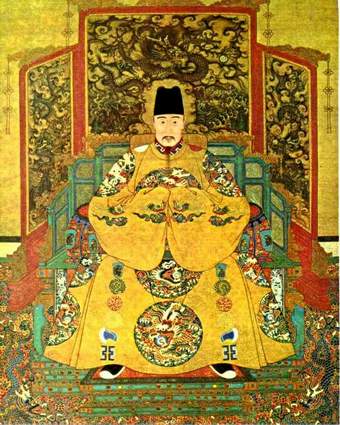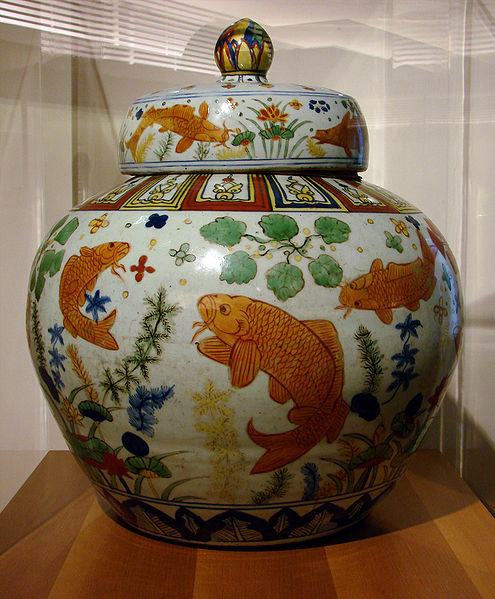<Back to Index>
- Philosopher Johannes Nikolaus Tetens, 1736
- Composer Jacques Mauduit, 1557
- 11th Ming Emperor of China Jiajing, 1507
PAGE SPONSOR


The Jiajing (or Chia-ching) Emperor (嘉靖 IPA: [tɕjɑ́tɕîŋ]; 16 September 1507 – 23 January 1567) was the 11th Ming Dynasty Emperor of China who ruled from 1521 to 1567. Born Zhu Houcong, he was the former Zhengde Emperor's cousin. His father, Zhu Yuyüan (1476 – 1519), the Prince of Xing, was the fourth son of the Cheng-hua emperor (1465 – 1487) and the eldest son of three sons born to the emperor's concubine, Lady Shao.
His era name means "Admirable tranquility". As the nephew of the Hongzhi Emperor,
Zhu Houcong was not brought up to succeed to the throne. However, the
throne became vacant in 1521 with the sudden death of the Hongzhi
Emperor's son, Emperor Zhengde, who did not leave an heir. The 14 year
old Zhu Houcong was chosen to become emperor, and so relocated from his
father's fief (near today's Zhongxiang, in Hubei Province) to Beijing. As
the Jiajing Emperor, Zhu Houcong had his parents posthumously elevated
to an "honorary" imperial rank, and had an imperial - style Xianling Mausoleum built for them near Zhongxiang. Custom
dictated that an emperor who was not an immediate descendant of the
previous one should be adopted by the previous one, to maintain an
unbroken line. Such a posthumous adoption of Zhu Houcong by Emperor
Zhengde was proposed, but he resisted, preferring instead to have his
father declared emperor posthumously. This conflict is known as "The Great Rites Controversy." The Jiajing Emperor prevailed, and hundreds of his opponents were banished, hit in the court (廷杖) or executed. Among the banished was the great Ming poet Yang Shen. The Jiajing Emperor was known to be a cruel and self-aggrandizing emperor and he also chose to reside outside of the Forbidden City in Beijing so he could live in isolation. Ignoring state affairs, Jiajing employed incapable individuals such as Zhang Cong and Yan Song,
on whom he thoroughly relied to handle affairs of state. In time Yan
Song and his son Yan Shifan - who gained power only as a result of his
father's political influence - came to dominate the whole government
even being called the "First and Second Prime Minister". Loyal
individuals such as Hai Rui and Yang Xusheng challenged
and even chastised Yan Song and his son but were thoroughly ignored by
the emperor. Hai Rui and many loyal ministers were eventually dismissed
or executed. Jiajing also abandoned the practice of seeing his
ministers altogether from 1539 onwards and for a period of almost 25
years refused to give official audiences, choosing instead to relay his
wishes through eunuchs and officials. Only Yan Song, a few handful of
eunuchs and Daoist priests ever saw Jiajing. This eventually led to
corruption at all levels of the Ming government. Jiajing's
ruthlessness also led to an internal plot by his concubines to
assassinate him in October, 1542 by strangling him while he slept. He
is said to have used young girl's menstrual blood as an elixir he hoped
would give him immortality. A group of palace girls who had had enough
of Jiajing's cruelty decided to band together to murder the emperor.
The lead palace girl tried to strangle the emperor with ribbons from
her hair while the others held down the emperor's arms and legs but
made a fatal mistake by tying a knot around the emperor's neck which
would not tighten. Meanwhile some of the young girls involved began to
panic and one ran to the empress. The plot was exposed and on the
orders of the empress, all of the girls involved, including the
emperor's favourite concubine, underwent execution by the slow slicing method and all their families killed. The Ming dynasty had enjoyed a long period of peace, but in 1542 the Mongol leader Altan Khan began
to harass China along the northern border. In 1550 he even reached the
suburbs of Beijing. Eventually the empire appeased him by granting
special trading rights. The empire also had to deal with pirates attacking the southeastern coastline; general Qi Jiguang was instrumental in defeating these pirates. Starting in 1550, Beijing was enlarged by adding the "Outer" or "Chinese City". The deadliest earthquake of all times, the Shaanxi earthquake of 1556 that killed over 800,000 people, occurred during the Jiajing Emperor's reign. In June 1548 Mongols attacked Xuan Fu and defeated the imperial army. In October they invade again and reached Hualai, which lay only a day ride from Beijing. Yen Sung blamed on the aggressive policies of his adversary Xia Yen,
but he himself offered no strategy to counter the invasion. Then Xia Yen
was executed. The Mongols army succeeded in penetrating the inner line of
Beijing defense and in approaching to Imperial tombs. In
March 1549, the Mongols attacked Xuan Fu again, Altan routed the imperial
army but the Ming force managed to block his retreat and won several
encounters. During this raid, several Ming commanders were warned that
if trade is not allowed, Beijing would be attacked in the fall. Upon
hearing this, Jiajing Emperor ordered that measures be taken to thwart
the plan. By
March 1550, no rain or snow had fallen for over 150 days. Spies
reported that the hordes were assembling for a major attack. After several skirmishes near Datong in
July the Mongols rode east, having been bribed by the commandant of the
region to go elsewhere. On 26 September the entire raiding party
breached the defense of Gubei Pass, just 40 miles northeast of Beijing
and went south of Tongzhou,
where a camp was established. On 30 Septembers an advance party reached
the gates of Beijing and the city was besieged, and the suburbs were
looted. In
1550 the military register for capital garrisons carried about 140,000
names, but only fifty or sixty thousands were assigned to military
duties, the rest worked on constructions projects. The soldiers refused
to go outside of the city to fight. On the other hand, a reinforcement
army
arrived to defend the city but had no provisions. The army was
starving, unfit to fight and was looting. The ministry of war was in
stress over this situation, and on Yen Sung advise, the various
regional commanders were ordered not to pursue, so the raiding parties
were able to
retreat several days later. On
6 October 1550, the minister of war was executed by Jiajing Emperor
for not having been able to defend Beijing. After that, general Qiu
Lan was trusted by Jiajing on military affairs, he was the commander
who previously bribed the Mongols to pass by Datong. Qiu’s forces
engaged the Mongols on 6 October, with thousands of menlost, and Qiu
barely escaped with his life, but he reported a victory to the
Emperor. Qiu lan was rewarded as commander of all army garrisons and
training camps around Beijing. He was a devoted follower of Taoism and attempted to suppress Buddhism.
After the assassination attempt in 1542, Jiajing began to pay excessive
attention to his Taoist pursuits while ignoring his imperial duties. He
built the three Taoist temples Temple of Sun, Temple of Earth and Temple of Moon and extended the Temple of Heaven by adding the Earthly Mount.
Over the years, Jiajing's devotion to Taoism was to become a heavy
financial burden for the empire and create dissent across the country. Particularly
during his later years, Jiajing was known for spending a great deal of
time on alchemy in hopes of finding medicines to prolong his life. He
would forcibly recruit young girls in their early teens and engaged in
sexual activities in hopes of empowering himself, along with the
consumption of potent elixirs. He employed Taoist priests to collect rare minerals from all over the country to create elixirs, including elixirs containing mercury, which inevitably posed health problems at high doses.
After
45 years on the throne (the second longest reign in the Ming dynasty),
Emperor Jiajing died in 1567 – possibly due to mercury overdose – and
was succeeded by his son, the Longqing Emperor.
Though his long rule gave the dynasty an era of stability, Jiajing's
neglect of his official duties resulted in the decline of the dynasty
at the end of the 16th century. His style of governing or for that
matter the lack thereof would be emulated by his grandson later in the century.